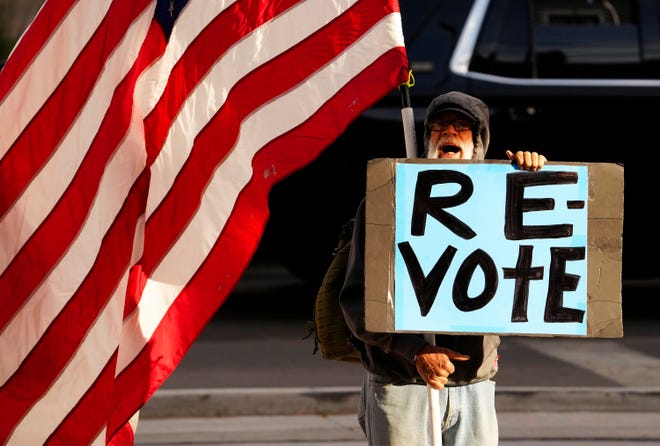Election conspiracy theories are nothing new. Why do we keep falling for them?
The votes have been counted, but the conspiracy theories live on. And some of the strangest allegations were pushed by prominent D.C. politicians.
“We are requesting an investigation into all the allegations of irregularities with respect to the electronic and other voting machines,” one congressman said. “So that people can have confidence in the result of this election, and so that any weaknesses are changed before the next election.”
To be fair, that was a crazy election year. No, not 2022. I’m talking about 2004.
When President George W. Bush defeated John Kerry, allegations of election conspiracies ran rampant. Floridians claimed votes were changed for Bush, Ohioans claimed their county website showed more votes than voters, and other Kerry backers claimed Diebold voting machines delivered false numbers.
The rumors were so prevalent that Rep. Jerry Nadler (D-N.Y.) demanded an immediate investigation, offering the quote above.
Politicians blame everything but themselves

Today, the conspiracy theories are coming from Arizona Republicans, who are just as bitter as Rep. Nadler was 18 years ago. The claims were nonsense then and nonsense today. Just as they were from the losing party in every election going back two decades.
Why hasn’t Kari Lake conceded two weeks on? For that matter, why hasn’t Donald Trump two years on?
How did Katie Hobbs win?Team details her victorious strategy
Whether running for office or running the country, some politicians aren’t big on accepting blame. It’s just easier to point fingers at some shadowy, unprovable conspiracy for their loss than to admit the obvious: they blew it.
When Hillary Clinton lost to Trump of all people, she called his presidency illegitimate and blamed Russian hacking. Today, Kari Lake blames her loss to Katie Hobbs (of all people) on “mass voter disenfranchisement.”
The first stage of grief is denial, but she should have moved on to acceptance by now.
But why do voters fall for their conspiracies?
While elaborate conspiracies might comfort a second-place finisher, why do so many of their voters fall for the deception?
One reason is an unhealthy connection with a political leader. Over-identifying oneself with a politician is just as unhealthy as fixating on a movie star or famous athlete.
Also, super-supporters tend to hang out with other super-supporters, which skews their analysis. “I can’t believe Nixon won,” Pauline Kael allegedly said in 1972. “I don’t know anyone who voted for him.”
But the biggest reason for swallowing conspiracy theories is a sense of fear combined with lack of control. This goes far beyond election results.
According to polling, 23% of Americans believe that 9/11 was an inside job. Blaming that horror on a powerful man behind the curtain is reassuring in a backhanded way. It’s comforting to think some evil genius is moving the levers than to accept 19 wackos upended American foreign policy and ended countless lives.
No wonder we fall for it. We trust no one
The brain’s tendency toward pattern recognition factors in as well, especially on social media. Any dumb Twitter user can start an Alex Jones-style rumor with three unrelated news images and the phrase “this isn’t a coincidence” when it’s obviously a coincidence.
Add in Americans’ deep distrust of nearly every national institution, and you have an ideal environment for conspiracy mongers. In Gallup’s latest poll measuring public trust in 16 major institutions, only two get a passing grade.
If you think that your leaders, journalists and darn near everyone else is lying to you, you’re going to invent your own reasons, no matter how outlandish.
Back in 2004, Rep. Kendrick Meek (D–Fla.) was asked why Kerry lost. “We did a good job, but the other side did a better job,” he said.
Then as today, it’s nice to see a few adults in the room.
Jon Gabriel, a Mesa resident, is editor-in-chief of Ricochet.com and a contributor to The Republic and azcentral.com. On Twitter: @exjon.

